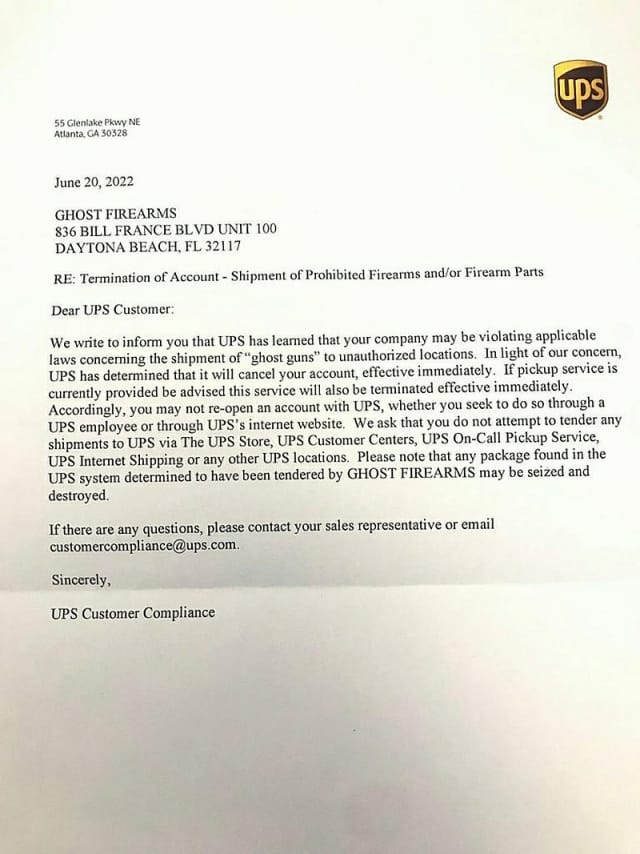United Parcel Service (UPS) announced strict new rules regarding firearms and firearms parts shipments last month. As of September 1, 2022, UPS will only ship parts from licensed dealers, importers, manufacturers, and collectors.

UPS Terms of Service
The UPS Terms of Service state that:
Packages containing firearms (as defined by Title 18, Chapter 44, and Title 26, Chapter 53 of the United States Code) and firearm parts that do not constitute firearms as defined by federal law (together, “Firearm Products”) are accepted for transportation only as a contractual service and only from Shippers who are licensed importers, licensed manufacturers, licensed dealers, or licensed collectors (as defined in Title 18, Chapter 44 of the United States Code). To transport Packages containing Firearm Products, the Shipper must enter into an approved UPS agreement for the transportation of Firearm Products.
The Shipper shall comply with and shall ensure that each Shipment containing Firearm Products complies with all federal, state, and local laws applicable to the Shipper, recipient, and Package, including, without limitation, age restrictions.
Further, UPS reserves the right to decide for themselves whether a given company complies with the law. Daytona Beach, Florida’s Ghost Firearms found that out the hard way. A June 20, 2022, letter informed Ghost Firearms owner Joe Zatar that “UPS has learned that your company may be violating applicable laws concerning the shipment of ‘ghost guns’ to unauthorized locations. In light of our concern, UPS has determined that it will cancel your account, effective immediately.”
The letter said that any Ghost Firearms product currently in their system “may be seized and destroyed.” Zatar said that “We do not ship to states where they’re not allowed. We’re in total compliance. I had ATF in here just two weeks ago, and they told us we were completely legal.” Zatar also noted that he had just shipped over $30,000 in products. So, despite ATF compliance, UPS decided they know better.

Serial Numbers
UPS has additionally decreed that nearly everything requires a serial number:
Any item that meets the definition of a firearm (including firearm mufflers or silencers) or a “frame” or “receiver” under federal law (including any partially complete, disassembled, or nonfunctional frame or receiver as defined by 27 CFR § 478.12) must be identified and bear a serial number in satisfaction of the requirements for identifying such items under federal law, including 27 CFR § 478.92 and/or 27 CFR § 479.102, regardless of whether any such items are otherwise exempt from or not subject to identification requirements under applicable law. This prohibition applies even before the effective date of 27 CFR § 478.12.
UPS does not accept Firearm Products for shipment domestically unless (1) such shipments are in full compliance with all federal, state, and local laws, including, without limitation, age restrictions; (2) such firearms, including any partially complete, disassembled, or nonfunctional frame or receiver (as defined by 27 CFR § 478.12), have been identified and bear a serial number in a manner that complies with federal law; and (3) such firearm parts within a package cannot be assembled to form a firearm.
This is clearly aimed at so-called “ghost guns,” or ‘spooky boys” as my man Andrew at ARFCOM calls them. So, even though companies like Polymer 80 and Ghost Firearms are complying with the ATF’s Frames and Receivers rule, UPS has just decided that they know better. Again. No word on how UPS proposes to enforce that rule, outside of visually inspecting every package’s contents.

The Onerous UPS Shipping Agreement
Any firearms dealer or manufacturer who wants to ship with UPS must comply with the following agreement:
Before making any Firearm Products Shipment under this Agreement, Shipper must submit to UPS, by email to [email protected] complete, current and accurate licensing documentation of Shipper’s federal firearms license, as well as satisfactory completion of, and compliance with, any other applicable licensing requirements, including any applicable state requirements. Shipper may not tender Firearm Products Shipments to UPS unless and until UPS has confirmed receipt in writing of Shipper’s licensing documentation.
Furthermore, the shipper must agree to train their employees on the UPS requirements, as well as perform “self-assessments” to ensure compliance:
The compliance program must “include: (1) training for sales and marketing employees regarding lawful recipients, possessors, and purchasers of Firearm Products; (2) due diligence regarding customer licensure or authorization to receive, possess, and purchase Firearm Products under applicable federal, state, or local law; and (3) self-assessments of the Shipper Compliance Program to guarantee its effectiveness.”
In other words, UPS is making its own rules beyond the ATF and it’s up to its customers to make sure those rules are followed.
Why now, UPS?
Well, it seems that five antigun Senators sent letters to 28 package carriers, including UPS, back in May, saying that “We are concerned that lax shipping security measures are contributing to the epidemic of gun violence in this country by allowing criminals to use stolen firearms to commit crimes.” So, these Senators are implying that UPS and other carriers bear some responsibility for the actions of murderers. The five Senators are Ed Markey (D-MA), Dick Blumenthal (D-CT), Cory Booker (D-NJ), Chris Murphy (D-CT), and Dianne Feinstein (D-CA).

Searching Questions
The letter also required the companies to respond to the following questions:
1) Please explain your company’s policy and procedures regarding the transport and delivery of packages containing firearms. If applicable, please provide responses for both your company’s freight and parcel delivery lines of business.
- Does your company permit the shipping of packages containing firearms? If so, by whom and under what conditions? Do you require proof of identity by the seller and, if so, what proof is acceptable?
- How does your company define “firearms” for these purposes? Are imitation firearms, frames, receivers, ammunition, and silencers included in this definition?
- Does your company restrict the delivery service options available for shipping packages containing firearms (e.g., all shipments containing firearms must be sent by overnight secure service)?
- What type of notice does your company require from the sender about the contents of any shipment containing firearms? Does this notice vary depending on whether or not the sender is a federal firearms licensee?
- How do your company’s disclosure requirements for shipping packages containing firearms compare to those for other, though more strictly regulated, hazardous products such as lithium-ion batteries or pharmaceuticals?
- How does your company satisfy its obligation under 18 U.S.C. § 922(f)(2) to obtain written acknowledgment of receipt from the recipient of a package or other container in which there is a firearm? Does your company require proof of identity from the recipient prior to the release of such packages?
- In the last 24 months, has your company changed any of its policies regarding the transport and delivery of packages containing firearms? If so, how have any policies changed and why?
- Does your company report to local or federal law enforcement, the sender, or the intended recipients any lost or stolen packages containing firearms?
2) How many packages containing firearms did your company transport between January 1, 2017, and December 31, 2021?
- How were these packages transported (e.g., air, train, ground delivery)?
- How many of those packages were reported lost or stolen prior to delivery to their intended recipients?
- Did your company report to federal law enforcement these lost or stolen firearms?

3) What additional security measures, if any, does your company take when transporting packages containing firearms to ensure safe delivery to their intended recipients?
- Do those security measures extend throughout the shipping process (i.e., even if subcontractors are used for any part of the shipment or delivery)? If so, how does your company ensure that subcontractors provide this level of security?
- Does your company, as a matter of policy, require additional clearances (e.g., background checks) for employees responsible for handling packages containing firearms?
- How do these security requirements compare to those for other highly regulated and potentially dangerous products such as lithium-ion batteries or pharmaceuticals?
4) What records does your company keep and maintain about lost or stolen shipments, generally? What records does your company keep and maintain regarding packages containing firearms?

UPS Bowed to the Threat
All those questions are intrusive, but the most outrageous is the question asking how the companies define firearms. It is not the shipper’s job to define firearms. That, unfortunately, falls to the ATF. But UPS, at least, has taken the hint and decided to define firearms on their own terms, as evidenced above.

There seems to be little question that these Senators have influenced the UPS policies, as was, almost certainly, their intent. That UPS caved was predictable. Given the lawsuits anti-gun organizations are leveling at targeted companies made it all but inevitable. A threatening letter from five Senators, even if the threats are veiled, carries weight in that environment.
It’s easy to say that UPS should have stood firm for their customers’ rights, and I agree with that. But few entities will risk major lawsuits to protect their customers. It’s the world we live in, and these five anti-gun Senators played a shrewd hand.


